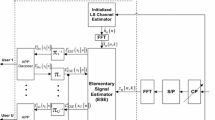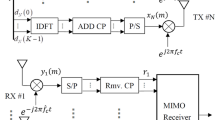Abstract
In this contribution, the performance of an adaptive least squares channel estimator for a time correlated MIMO-OFDM channel is presented in a closed form relation. As a criterion for performance evaluation, the well-known mean square error (MSE) is employed. The pilot aided channel estimation is used to extract the channel coefficients. To minimize the MSE and arrange phase shift orthogonally, the pilots are constructed with equal power and space. The model of the channel is developed by implementing a first order Markov model, and it is proved that the performance of the system is dependent upon the defined forgetting factor, the number of transmit antennas, the number of multipath channel taps, transmitted power, and Doppler shift. The effect of each parameter on the performance of the system is discussed separately. The computer simulation results follow with the analytical results comprehensively.
Similar content being viewed by others
References
Kalbasi R., Falconer D., Banihashemi A.H., Dinis R. (2009) A comparison of frequency-domain block MIMO transmission systems. IEEE Transactions on Vehicular Technology, 58(1): 165–175
Foschini G. J., Gans M. J. (1998) On limits of wireless communications in a fading environment when using multiple antennas. Wireless Personal Communications 6(3): 311–335
Zou W. Y., Wu Y. (1995) COFDM: An overview. IEEE Transactions on Broadcasting 41: 1–8
Telatar, I. (1995). Capacity of multiple antenna Gaussian channels. AT&T Tech. Memo, NJ.
Jeon, W. G., Paik, K. H., & Cho, Y. S. (2000). An efficient channel estimation technique for OFDM systems with transmitter diversity. In Proceedings of IEEE international symposium on personnel, indoor and mobile radio communications (Vol. 2, pp. 1246–1250).
Jafarian, H. Z., & Pasupathy, S. (2006). MIMO-OFDM channel estimation using improved LS algorithm. In Proceedings of IEEE vehicular technology conference. September, 2006.
Kim, K. J., Pun, M., & Iltis, R. A. (2008). QRD-based precoded MIMO-OFDM systems with reduced feedback. In Proceedings of IEEE international conference. May, 2008.
Karami E. (2007) Tracking performance of least squares MIMO channel estimation algorithm. In IEEE Transactions on Communications, 55(11): 2201–2209
Barhumi I., Leus G., Moonen M. (2003) Optimal training design for MIMO OFDM systems in Mobile wireless channels. IEEE Transactions on Signal Processing 5: 1615–1624
Negi R., Cioffi J. (1998) Pilot tone selection for channel estimation in a mobile OFDM system . IEEE Transactions on Consumer Electronics 44: 1112–1128
Yin, C., Li, J., Hou, X., & Yue, G. (2006). Pilot aided LS channel estimation in MIMO-OFDM systems. In Proceedings of IEEE signal processing.
Dinis R., Gusmo A. (2004) A class of non-linear signal processing schemes for bandwidth-efficient OFDM transmission with low envelope fluctuation. IEEE Transactions on Communications 52(11): 2009–2018
Gusmo, A., Dinis, R., Conceiç, J., & Esteves, N. (2000). Comparison of two modulation choices for broadband wireless communications. In Proceedings of IEEE VTC-Spring, Tokyo, Japan (pp. 1300–1305). May, 2000.
Dokhanchi, S. H., & Falahati, A. (2010). Adaptive MIMO LS estimation technique via MSE criterion over a Markov channel model. In IEEE Symposium on Computers and Communications (ISCC).
Komninakis C., Fragouli C., Sayed A. H., Wesel R. D. (2002) Multi-input multi-output fading channel tracking and equalization using Kalman estimation. IEEE Transactions on Signal Processing 50(5): 1065–1076
Author information
Authors and Affiliations
Corresponding author
Rights and permissions
About this article
Cite this article
Dokhanchi, S.H., Falahati, A. Tracking Performance of an Adaptive MIMO-OFDM LS Estimator via MSE Criterion Over a Wireless Time Correlated Fading Channel. Wireless Pers Commun 68, 517–533 (2013). https://doi.org/10.1007/s11277-011-0466-5
Published:
Issue Date:
DOI: https://doi.org/10.1007/s11277-011-0466-5




